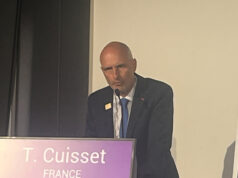 Laguna Tech USA has announced that a record number five patients were successfully treated at a single centre on the same day with the Zeta balloon-expandable transcatheter aortic valve implantation (TAVI) device to treat aortic valve disease.
Laguna Tech USA has announced that a record number five patients were successfully treated at a single centre on the same day with the Zeta balloon-expandable transcatheter aortic valve implantation (TAVI) device to treat aortic valve disease.
In all cases, patients achieved complete resolution of aortic disease with no residual stenosis or regurgitation immediately following the procedure, and all patients were discharged within 24–48 hours of the procedure, the company said in a press release.
All five implants were accomplished on the same day at the Instituto Nacional de Torax in Santiago, Chile within the ongoing feasibility trial for the Zeta system.
The Zeta system is a novel balloon-expandable transcatheter valve with six expanding arms and a low profile covered delivery system.
Christian Dauvergne (Instituto Nacional de Torax, Santiago, Chile), said: “Our ability to successfully implant the Zeta aortic valve in five patients with complex, diverse clinical profiles on a single day was due to the very simple and efficient design characterised by a low profile and straightforward transcatheter system, which allows for simple, advantageous placement in the heart. I look forward to the continued development of the Zeta device to explore the potential of this breakthrough technology to treat more patients with aortic regurgitation with unmet needs.”
The lead primary investigator in the study of the device, Scott Lim (University of Virginia, Charlottesville, USA), said: “The treatment of complex and diverse aortic valve disease patients at the centre in Santiago was an impressive accomplishment, as was the highly reproducible landing of the Zeta valve relative to the aortic annulus, regardless of the degree or lack of calcium, which speaks to the potential of the balloon-expandable Zeta aortic valve. We treated patients both with severe, non-calcific aortic regurgitation as well as those with highly calcific aortic stenosis, and in all cases there was no paravalvar regurgitation. Additionally, by fluoroscopy, all implanted Zeta valves were consistently implanted within 2mm of the annulus. I look forward to the upcoming pivotal clinical trials on the ZETA valve.”
“We are thrilled with this significant and rapid progress in the development of the Zeta valve,” said Gilbert Madrid, chief executive officer of Laguna Tech USA. “Together with the encouraging data we have generated with our other device, the Alpha valve and its successful implants, we are making important advancements in realising the promise of our next-generation, differentiated aortic valves. With two varying valve designs, each leveraging advanced technology and engineering of existing products on the market, we look forward to the potential of our technology to significantly expand the number of patients with aortic valve regurgitation who may be treated with our minimally invasive treatment options. We look forward to scaling this technology and moving into later stage clinical development so we can bring this technology to a greater population of patients.”










